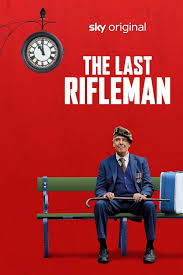
THE LAST RIFLEMAN
Ireland/UK, 2023, 95 minutes, Colour.
Perce Brosnan, Clemence Poesy, John Amos, Jurgen Prochnow, Ian McIlhinney, Samuel Bottomley.
Directed by Terry Loane.
This is a film which will entertain and inspire older audiences. It is an Irish-English production, focusing on an Irish character, a rifleman in World War II, and D-Day, some sequences of the fighting, the confrontation with the Germans, fear and heroism. While his friends have died, at the opening of the film, he is, as he states, 92 ¾. He is in an aged care home, with his wife of 68 years who has dementia, who dies.
Audiences who have seen Michael Caine and Glenda Jackson in the story based on the same characters and events, The Great Escaper, will note the similarities. But, of course, there are differences, English and Irish settings, various difficulties on travelling to the D-Day celebrations, the encounters along the way, the role of the media, the acclaim for both The Great Escaper and The Last Rifleman.
A great interest is the presence and performance by Pierce Brosnan, acting more than 20 years older than he is in real life, effective make up, a dignified personality, loyalty to his wife, loyalty to the memories of his friend, deciding to go to the D-Day celebrations for the first time returning.
The film is entertaining in the various steps for his travels, train, cab, bus, hitchhiking in the truck, the ferry to Normandy. And, encounters along the way, an earnest young man with a love of the music of Ennio Morricone and a pleasant anecdote and themes from The Mission, a fussy lady with her medications on a train, a very cheerful woman truck driver, a helpful cab driver, and a French woman (Clemence Poesy) and her two children who are able to smuggle him across the channel.
There is also an encounter with a German soldier, Jurgen Prochnow, and some mutual reflections, an encounter with an African-American soldier played by John Amos.
This is a quietly were reflective film about war and its consequences, on relationships, love and sadness, the dignity of older age and coming to terms with the past.
- Based on a memoir? (Comparisons with The Great Escaper?) Memories of D-Day, memories of war action, injuries and death? Living with the memories into old age? A story for the 21st-century audience?
- The Irish setting, the home for aged care, the rooms, dining room, offices? Travel in Ireland, cabs, buses, trains? The ferry to Cherbourg? The helicopter at the end? The French settings, the town, Normandy?
- Artie Crawford and his story? The flashbacks, the friendship with Charlie and Maggie, the photos, the beach? The scenes of action, confronting the Germans, the British and the Irish, the casualties? Artie and his fear, behind the tree? Charlie and his concern, helping Artie, going ahead, Charlie’s death?
- Artie, 92 ¾, in the home, waking, his room, going to Maggie, the 68 years of marriage, her dementia, feeding her the ice cream, her saying Charlie? His tenderness, the kiss, sitting in the room, the quietness of her death?
- Artie, the letters and photos, writing the letter to Charlie? Inviting Charlie to the 75th commemoration? The reality of Charlie’s death, Artie marrying Maggie?
- At the home, the discussions with Tom, the D-Day 75 years celebrations, Tom and reading the paper, phoning the journalist, the confrontations with the authorities at the home?
- Artie, the decision to go, packing, his health and medication, his age, sitting outside, the laundry van, escaping in the back of the van, £20 to the driver for directions, going to the station, the free travel for those aged, in the train, the lady with her medication, chatter, helping him? The delay in getting to the ferry? The assault by the young men? The help by the cab driver, the ride and the talk, the cabby’s tribute, no fee? In the bus, the young man, helping Artie to his seat with the case, the discussion, Morricone, the reminiscence that Artie met him in Verona with his wife, shook his hand, the playing of the theme from The Mission and Artie listening, the breakdown of the bus, Artie starting to walk, the young man with him, thumbing a lift, the French family refusing, the truck driver, the woman, the talk, Artie and his turn, diabetes, Coca-Cola and the sugar?
- The problems at the ferry, his outdated passport, the authorities? Juliette and her family, the family holiday, her health? Returning home, the van? Hiding in the van, on board, giving him the room, his turn, the nurse and the doctors, plan to get him out, the van driver, Juliette picking him up, the friendship with the children, discussions about the ice cream, the seeing him on television and the boy excited? The farewell and his thanks?
- The bus with the German soldiers, his attitude, some bitter memories, the conversation with the soldier, the reminiscences, gradual mellowing, singing A Long Way to Tipperary, the German and his young days, losing the war, discovering he was on the wrong side, the reconciliation, the German waving to the British troops and their waving back?
- Artie, the tourism office, going to the restaurant, encountering the American and his granddaughter, the conversations and reminiscences, the medals, the death of the American’s brother landing on D-Day, mutual respect?
- The journalist, given the story by Tom, flying to Paris, getting to Normandy, the tourist office, finding Artie, explaining the situation?
- The ceremonies, Artie having to face the truth that he was the last of the riflemen, going to the cemetery, Charlie’s grave, the memories, the media, the helicopter ride, Charlie and the acclamation?
- The sadness of the story, the nobility of the human spirit, age, dementia, the influence of the past, the possibilities of facing the past and facing the future, even in old age?